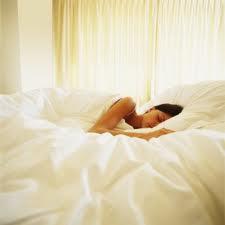 How many of you have ‘issues’ with either the quality or quantity of your sleep? This is a question I ask when I’m speaking to large audiences about their resiliency to stress. In every group approximately 75% of people raise their hands, and I’ll bet at one time or another you’ve fallen into this large category. Not only does poor sleep negatively impact your mood, energy and job performance, it’s also linked to an increase in weight gain, food intake (especially high sugar carbohydrates), and a higher risk for diabetes and cardiovascular disease, as well as a decrease in immunity.
How many of you have ‘issues’ with either the quality or quantity of your sleep? This is a question I ask when I’m speaking to large audiences about their resiliency to stress. In every group approximately 75% of people raise their hands, and I’ll bet at one time or another you’ve fallen into this large category. Not only does poor sleep negatively impact your mood, energy and job performance, it’s also linked to an increase in weight gain, food intake (especially high sugar carbohydrates), and a higher risk for diabetes and cardiovascular disease, as well as a decrease in immunity.
Increased levels of stress can often lead to sleepless nights, which in turn lowers our ability to successfully deal with the hassles of our everyday lives – it’s a downward spiral. Here are a few tips to pull you out of that negative feedback loop and to get you feeling more resilient and energized!
Kids need a bedtime routine, and so do you. What rituals do you have in place to ready your mind and body for sleep? You should have a period of transition to allow the brain and body to start slowing down. Going abruptly from “work” mode to sleep usually doesn’t work too well. Neither does checking email right before you go to bed. Read a book, take a warm bath or shower, do some gentle stretching, or anything else that relaxes you.
Consistency is key. Go to bed and wake up at the time. You’re training your body to know when to wind down and when to rev up. An erratic sleep/wake cycle can make it difficult fall asleep or to wake up feeling refreshed.
Cease caffeine intake by 2:00 in the afternoon, by noon if you’re more sensitive. Caffeine can stay in the body for quite a long time and hinder you from falling asleep at bedtime. Be aware that certain foods like chocolate contain caffeine as well.
Limit alcohol intake. Drinking alcohol may make you fall asleep faster, but you’ll wake up more often during the night and spend less time in the deeper, restorative stages of sleep. Limit intake to 1 drink if you’re a woman, up to 2 drinks if you’re a man.
Get regular exercise. People who exercise fall asleep more quickly, sleep more soundly, and wake up feeling more rested and refreshed. Aim for 4-6 times per week and finish your exercise session at least 3-4 hours before you plan on going to bed. Exercise releases hormones that give us higher levels of energy, so exercising right before bed may make it difficult to fall asleep.
Create a drop in body temperature. Just before and during sleep, body temperature drops. Purposely dropping body temperature can aid in sleep onset. Set your bedroom to a cooler temperature or take a hot shower or bath before bed, and the resulting drop in body temp after leaving the hot water will help you fall asleep more quickly.
 How many of you have ‘issues’ with either the quality or quantity of your sleep? This is a question I ask when I’m speaking to large audiences about their resiliency to stress. In every group approximately 75% of people raise their hands, and I’ll bet at one time or another you’ve fallen into this large category. Not only does poor sleep negatively impact your mood, energy and job performance, it’s also linked to an increase in weight gain, food intake (especially high sugar carbohydrates), and a higher risk for diabetes and cardiovascular disease, as well as a decrease in immunity.
How many of you have ‘issues’ with either the quality or quantity of your sleep? This is a question I ask when I’m speaking to large audiences about their resiliency to stress. In every group approximately 75% of people raise their hands, and I’ll bet at one time or another you’ve fallen into this large category. Not only does poor sleep negatively impact your mood, energy and job performance, it’s also linked to an increase in weight gain, food intake (especially high sugar carbohydrates), and a higher risk for diabetes and cardiovascular disease, as well as a decrease in immunity.
